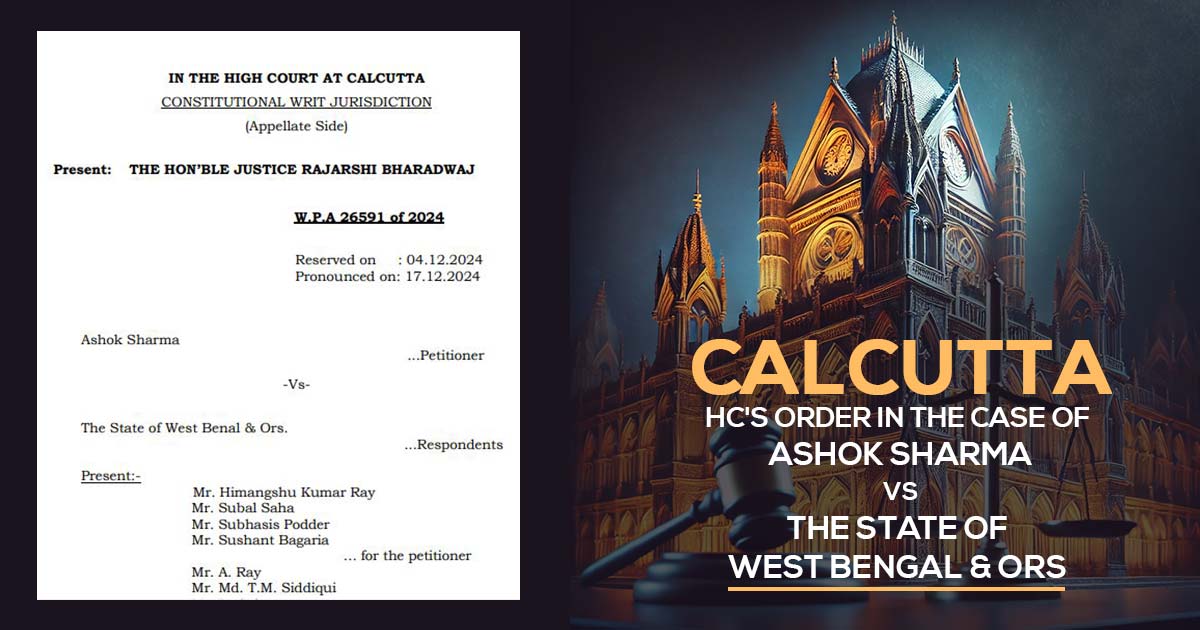
Under the Goods and Services Tax Act, regulatory measures cannot be labelled as violative of a taxpayer’s right to trade/ business under Article 19(1)(g) of the Constitution, Calcutta High Court ruled.
The reason is being furnished by Justice Rajarshi Bharadwaj that the regulatory actions are “necessary to ensure compliance and prevent tax evasion”.
The observation arrived in a petition furnished via an iron and steel trader, arguing that the mismatch in the description of its goods seized in the transportation and the physical verification by the GST Department were minimal and the action of GST authority of seizing its goods and vehicle under Section 129(1) of GST Act and Rule 138A of the CGST Rules, was breached of its fundamental rights.
The weight of the goods of the applicant cited in the invoices matched the weight recorded at the time of verification. However, there were classification differences in as much as the ‘TMT Bars’ were specified as different in sizes.
The applicant cited that the said discrepancies were lesser and did not comprise a nonstatutory object to evading tax. It alleged procedural breaches and errors in documentation via the respondents.
It invoked Article 19(1)(g) of the Constitution to claim that it is qualified to sell the goods without being needed to cite the size of the goods in the invoice and the respondent’s claim on segregating the parts of the goods for valuation objectives is legally untenable.
Recommended: Simplified New Invoice Management System Under GST
Respondent, the seized goods demonstrated a substantial deviation in both their description and quantity compared to the declared one which consequences in a difference in the transaction value, stating a willful attempt to evade tax.
It claimed that the absence of consistency and clarity in the inventory records of the applicant recommended a wilful attempt to conceal the correct state of business affairs from the taxing authority.
Read Also: GST Credit Allowed on Delayed GSTR-3B, Directs Refund of Penalty and Interest to Petitioner
The HC specifies the goods and vehicle detention of the applicant to be statutory. It noted that the discrepancies between the shown description of goods and the physical verification notified were influential.
“While the petitioner argued that the differences were minor trade variations, this Court concluded that the mismatch, coupled with a substantial gap between the declared and verified valuation, indicated a deliberate misrepresentation. Such discrepancies undermined the accuracy of the petitioner’s declarations, which are crucial for determining tax liability, justifying the imposition of penalties under the GST framework.”
The court under this mentioned claim of the applicant’s procedural breach cannot direct the detention and following the proceedings invalid, since the major findings of the matter remained unaffected.
Must Read: Exploring Section 16(4) of GST Act with Court Rulings on ITC
It marked that, “petitioner’s invocation of Article 19(1)(g) of the Constitution, claiming that the actions of the tax authorities infringed upon the fundamental right to carry on trade is rejected as regulatory measures under the GST laws are necessary to ensure compliance and prevent tax evasion and do not constitute a violation of fundamental rights.”
Also, the HC considered with the respondents that the failure of the applicant to keep consistent and transparent inventory records assisted the assumption of intent to evade taxes.
“This Court emphasized that under the GST laws, the burden of proof lies on the taxpayer to demonstrate compliance with statutory provisions. In this case, the petitioner failed to substantiate claims of legitimate trade practices or demonstrate that the valuation applied by the authorities was unreasonable,” the Court articulated and dismissed the petition.
| Case Title | Ashok Sharma vs. The State of West Bengal & Ors |
| Citation | W.P.A 26591 of 2024 |
| Date | 17.12.2024 |
| For the Petitioner | Mr Himangshu Kumar Ray, Mr Subal Saha, Mr Subhasis Podder, Mr Sushant Bagaria |
| Respondents | Mr A. Ray, Mr Md. T.M. Siddiqui, Mr D. Sahu, Mr S. Sanyal |
| Calcutta High Court | Read Order |








